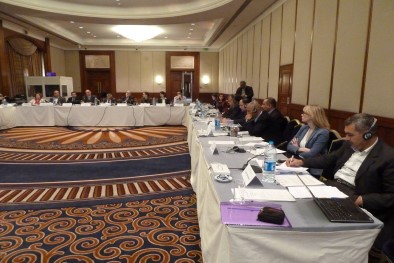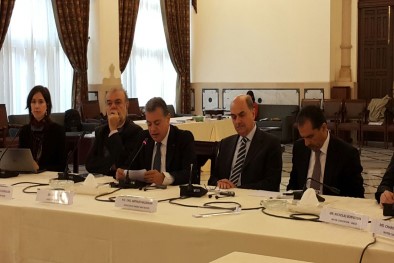In both countries, sustainable water management is vulnerable to the impacts of climate variability and socioeconomic changes. With severe water scarcity problems, Jordan is highly dependent on transboundary surface water and groundwater resources, while the challenge is intensified due to high water demand related to demographic growth and the refugees’ influx. On the other hand and despite being a relatively water-rich country for the Middle East, Lebanon is experiencing increasing drought episodes and water scarcity, while transboundary cooperation for the sustainable management of its transboundary watercourses and aquifers is gaining additional importance.
The Beirut workshop on “Key aspects and opportunities for Lebanon” was held on 4-5 February 2015, in cooperation with the Ministry of Energy and Water of Lebanon and hosted by the Council of Ministers.
In his opening speech, the Minister of Energy and Water of Lebanon, H.E. Arthur Nazarian, recognised that “the preservation of international transboundary waters over years and generations requires joining international agreements under the United Nations umbrella”, whereas Dr. Fadi Comair, Director General of Hydraulic and Electrical Resources underscored that “International water law is key to resolving disputes over the management of transboundary waters”, noting that “aligning with the principles of equitable sharing and reasonable use of transboundary waters is in the interest of Lebanon and riparian countries”. As a concrete follow up to the workshop, the Lebanese Ministry of Energy and Water will commission a legal and technical analysis to guide next steps.

The Amman workshop entitled “Legal frameworks for transboundary water cooperation: Focus on the Water Convention” was held on 10 March 2015, in cooperation with the Ministry of Water and Irrigation of Jordan - under the patronage of the Secretary General H.E. Basem Telfah - and the UNESCO International Hydrological Programme (UNESCO IHP).
During the workshop, H.E Mr. Basem Telfah stressed "the need for a stable framework for the sustainable management of the Jordanian water resources”. During his intervention, Mr. Massimo Cozzone, Chair of the Meeting of the Parties to the UNECE Water Convention, highlighted the value of the Convention for the countries that enables them to “have a voice in global discussions, effectively share experiences and knowledge through multilateral mechanisms” which “contribute –through preventing water conflicts– to increasing global stability, peace and security”. In this respect, Prof. Michael Scoullos, Chairman at GWP-Med, emphasised that “if there is good will between the riparian countries, they can go as far as they wish in transboundary water management”, accentuating the importance of “the enabling environment with a proper institutional and legal framework” with the Water Convention to serve as “a tool in the toolkit of the countries, to be used as seen appropriate by governments” towards this direction. As a follow up, the Inter-Ministerial Committee set up by the Government will explore in depth the relevance of acceding to the Convention in the specific Jordanian context.
UNECE and GWP-Med are committed to provide information and assistance to both countries, as needed and requested.
